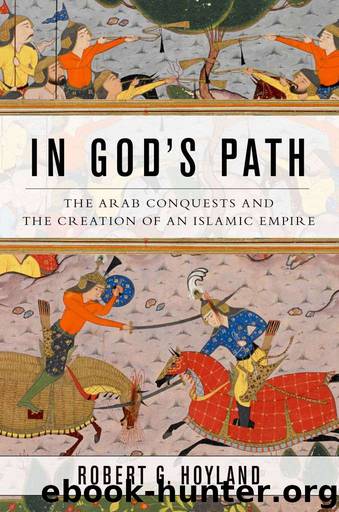In God's Path: The Arab Conquests and the Creation of an Islamic Empire (Ancient Warfare and Civilization) by Robert G. Hoyland

Author:Robert G. Hoyland [Hoyland, Robert G.]
Language: eng
Format: epub
Publisher: Oxford University Press
Published: 2014-09-16T00:00:00+00:00
FIGURE 5.4 Giant Buddha, carved into rock face at Bamiyan, Afghanistan. © Western Himalaya Archive Vienna.
Caucasia
The Arabs encountered the same sort of obduracy in the lands to the north of their realm. In 699, Muhammad ibn Marwan, who was the brother of ‘Abd al-Malik and responsible for these northern territories, decided to change the prevailing system of indirect rule via a local Armenian prince in favor of direct rule via an agent appointed by Muhammad himself. However, for this proud mountain people any move to reduce their independence and ancient privileges was regarded with hostility, and Armenian sources accuse the appointee of plotting to destroy the nobility of the land of Armenia and their cavalry. Smbat Bagratuni, who had been chosen as the new chief prince of Armenia in 693, roused the nobles against the Arabs and rallied an army, and in January 703 they marched down the river Araxes near to Nakhchawan, where an Arab garrison some 5,000-strong was stationed. The Armenians crossed the river and camped at Vardanakert, pursued all the while by the Arab garrison. It was now nightfall and so the Armenians barricaded the streets of the town and assigned guards to keep watch until dawn. As the sun arose, they performed mass and received communion, and then they organized themselves into units and readied themselves for the attack. Although the Armenian warriors numbered only 2,000, they had the advantage of surprise, launching themselves on the Arabs just as they were waking. Those who escaped the sword fell into the river Araxes, and soon drowned or froze, since it was a cold winter. Some managed to flee, “naked, barefoot and wounded,” and they sought refuge with a local princess. “She bandaged their wounds, healed them and gave them clothes to wear,” and sent them back to their country, earning the gratitude of the caliph himself. Smbat reported the victory to the Byzantine emperor and sent him some of the choicest booty, for which praise was heaped upon him and he was awarded honors and high rank.14
Another assault was targeted against a small Arab unit quartered in the region of Vaspurakan, to the southeast of Lake Van. Once the Armenians realized how few in number the Arabs were, they threw themselves upon them and slaughtered them mercilessly. Only 280 Arabs got away, and they sought sanctuary in a church. The Armenians did not want to harm the church and so they besieged the Arabs inside. One of the latter tried to appeal to the compassion of the Armenian leader, but he replied: “We were taught by our Lord that merciful treatment is due to the merciful. You, however, are a merciless nation and do not deserve mercy.” At this the Arab returned to his men and encouraged them to act as true soldiers and to go out fighting. All were slain by the sword, except for this one man, who, it turned out, had done a deal with the Armenians that he should not be slain if he got his companions out of the church, and so instead they threw him into the sea.
Download
This site does not store any files on its server. We only index and link to content provided by other sites. Please contact the content providers to delete copyright contents if any and email us, we'll remove relevant links or contents immediately.
The History of Jihad: From Muhammad to ISIS by Spencer Robert(2621)
Nine Parts of Desire by Geraldine Brooks(2361)
The Turkish Psychedelic Explosion by Daniel Spicer(2355)
The First Muslim The Story of Muhammad by Lesley Hazleton(2268)
The Essential Rumi by Coleman Barks(2043)
1453 by Roger Crowley(2023)
The Last Mughal by William Dalrymple(1855)
Trickster Travels: A Sixteenth-Century Muslim Between Worlds by Davis Natalie Zemon(1847)
Muhammad: His Life Based on the Earliest Sources by Martin Lings(1644)
God by Aslan Reza(1639)
by Christianity & Islam(1628)
A Concise History of Sunnis and Shi'is by John McHugo(1567)
No God But God by Reza Aslan(1540)
Magic and Divination in Early Islam by Emilie Savage-Smith;(1533)
The Flight of the Intellectuals by Berman Paul(1501)
Nothing to Envy by Barbara Demick(1445)
Art of Betrayal by Gordon Corera(1429)
What the Qur'an Meant by Garry Wills(1391)
Getting Jesus Right: How Muslims Get Jesus and Islam Wrong by James A Beverley & Craig A Evans(1340)
